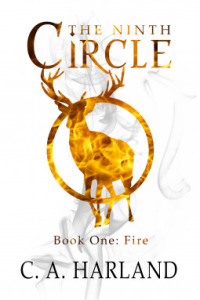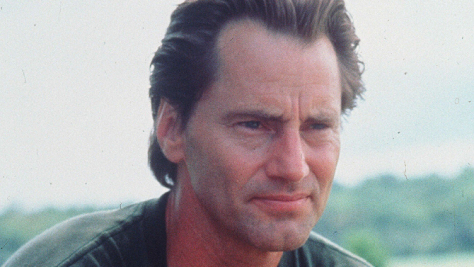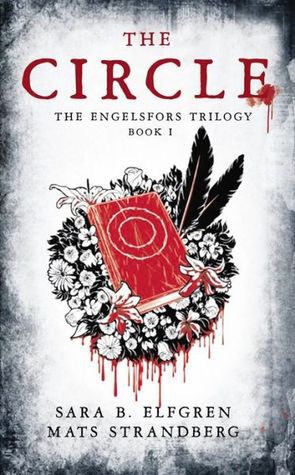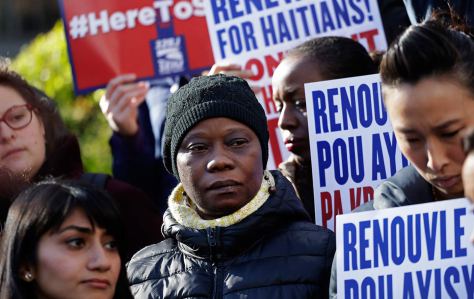
Title: The Ninth Circle, Book One: Fire
Author: C. A. Harland
Genre: Paranormal, Urban Fantasy
Version: ARC – eBook via NetGalley
Publisher: Self-Published
Synopsis: GoodReads
Notable Notables: Loads of Action Scenes, Emphasis on Family, No Romance
Recommended Readers: Fans of Supernatural and monster-hunting tales
Rating: ★★☆☆☆
Well. This whole thing was eerily familiar.
You may see people compare this book to Supernatural but with women, and honestly, they’re not wrong. Filling the role of Dean Winchester is Tala Morgenstern, a demon hunter who is all about the business, about family, who’s got a foul mouth, a chip on her shoulder, and a sacrificial streak. Sam Winchester is played by Aiva Morgenstern, the sister who tried to get out of the business and lead a normal life, who gets dragged back in after the third sister, Hartley (Castiel? An OC?), goes missing. Like Sam, Aiva’s secretive, unsure of herself, often gets in over her head, and tries to steer Tala’s morality toward something more to Aiva’s liking. The sisters even have an old family friend, a once-hunter, to help guide them whenever they need help, like Bobby does for the Winchesters.
Normally, I might have given this book a pass, but I found a free copy of it on NetGalley, and I do like stories of demons as antagonists. But those stories are a dime a dozen and tend to blend together in terms of unoriginality. However, The Ninth Circle, Book 1: Fire seemed to offer an interesting twist: demons engaged in organized crime, and if that ain’t my speed, I don’t know what is.
C. A. Harland presents an earthbound version of Dante’s Inferno where demons, fae, sirens, and other paranormal creatures are organized into Nine Circles, each representing the nine circles of hell and crimes associated with them. For example, the Fourth Circle deals with demonic creatures running casinos and other gambling dens, promoting the sin of greed. I was looking forward to the sisters exploring these circles, going deeper and deeper until they actually reached hell and rescued Hartley. The reality was… much less exciting and original.
The book is split up into twelve parts, and they are extremely episodic—another reason for the Supernatural comparison. Tala and Aiva get a lead, they go and investigate said lead, they get into a world of trouble, demon-fighting ensues, the girls win, they find some small clue about Hartley’s disappearance or their own developing powers, cue next episode.
After a few parts, I saw the repetition and started to skim, only reading the dialogue—and I never skim. I’m an incredibly visual reader. I like reading every word and retaining it, so the book plays out like a film in my head. With this book, I didn’t have to do that because everything significant going on plot-wise was in the dialogue.
Overall, this book wasn’t terrible. I’d just experienced the characters and story-style through another medium before, and the ending itself was extremely anti-climactic. All through the book, the sisters were building up to a confrontation with a Ninth Circle demon lord named Furfur. (I know, right? Ridiculous name. He could’ve been a cool antagonist, but I could not take him seriously with a name like that, and his full name, Furcifur, wasn’t much better.)
Furfur killed their expert demon-hunting mother and ended up also being the demon holding Hartley in his grasp. Once Tala and Aiva finally got there, the conflict was solved far too easily, and the twist with Hartley was disappointing and unbelievable. I wasn’t at all bothered about what happened to her.
Neither, it seemed, were the sisters. In fact, they were emotionally distant about their actions and potential consequences throughout the story. The worst example of this was with Tala when she accidentally killed a human, her first ever, because she mistook him for a demon. What was supposed to morally shake her was played off a few pages later as an “Oh well!” moment and was never brought up again. The little sympathy I had for her died and never came back after that, hurting my investment in all three sisters’ journeys because, after all, if nothing has consequences, then nothing really matters, right?
Unremarkable though it turned out to be, I’m glad I gave this one a shot. I do think it has the potential to be a better story, one without so many Supernatural comparisons, and maybe that’s what the author has planned for future books. Since I didn’t click with Aiva and Tala like I once did with Sam and Dean, though, I’ll be giving those a pass.
Advertisements Share this:- More





